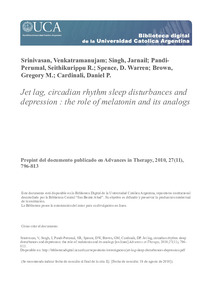Please use this identifier to cite or link to this item:
https://repositorio.uca.edu.ar/handle/123456789/1621| Título: | Jet lag, circadian rhythm sleep disturbances and depression : the role of melatonin and its analogs | Autor: | Srinivasan, Venkataramanujan Singh, Jarnail Pandi Perumal, Seithikurippu R. Spence, David Warren Brown, Gregory M. Cardinali, Daniel Pedro |
Palabras clave: | RITMO CIRCADIANO; DEPRESION; MELATONINA; INSOMNIO; FATIGA; TRASTORNOS DEL SUEÑO; RAMELTEON; TASIMELTEON; TRASTONOS CRONOBIOLOGICOS | Fecha de publicación: | 2010 | Editorial: | Springer | Cita: | Srinivasan, V., et al. Jet lag, circadian rhythm sleep disturbances and depression : the role of melatonin and its analogs [en línea]. Preprint de artículo publicado en Advances in Therapy. 2010, 27 (11). doi:10.1007/s12325-010-0065-y. Disponible en: https://repositorio.uca.edu.ar/handle/123456789/1621 | Resumen: | Abstract: Travelling through several time zones results in a constellation of symptoms known as jet lag. These include reduced alertness, daytime fatigue, loss of appetite, reduced cognitive skills, and disruptions to sleep/wakefulness and other circadian rhythms. In susceptible air travel passengers, jet lag may exacerbate affective illness ans result in psychiatric morbidity. It is suggested that dysregulation of circadian rhythms and melatonin secretion represents the common underlying factor in jet lag and other circadian disorders. Hence the effective management of jet lag requires timely application of the well known chronobiotic melatonin. Recent studies have emphasized the importance of strategically timed administrations of melatonin and appropriate limited exposure to environmental schedules. However, with the introduction of the melatonergic agonists such as ramelteon and tasimelteon, which have both a strong affinity for MT1 and MT2 melatonin receptors and a longer half life, a new therapeutic option now exists for treating the sleep disturbances associated with jet lag. The melatonin analogs are unique inasmuch as they can also enhance daytime alertness. Since jet lag exacerbates affective disorders in susceptible air‐travel passengers, and can thus produce psychiatric morbidity, there is a need for an effective antidepressant with chronobiotic properties. In this regard the recently introduced melatonergic antidepressant agomelatine, which has successfully established its supremacy over other antidepressants in having chronobiotic effects, represents a good choice for treating depressive symptoms that are associated with jet lag. | URI: | https://repositorio.uca.edu.ar/handle/123456789/1621 | ISSN: | 0741-238X (impreso) 1865-8652 (online) |
Disciplina: | MEDICINA | DOI: | 10.1007/s12325-010-0065-y | Derechos: | Acceso Abierto | Fuente: | Advances in Therapy. (2010), 27 (11) |
| Appears in Collections: | Artículos |
Files in This Item:
| File | Description | Size | Format | |
|---|---|---|---|---|
| jet-lag-sleep-disturbances-depression.pdf | 363,71 kB | Adobe PDF |  View/Open |
Page view(s)
395
checked on Apr 30, 2024
Download(s)
979
checked on Apr 30, 2024
Google ScholarTM
Check
Altmetric
Altmetric
This item is licensed under a Creative Commons License

